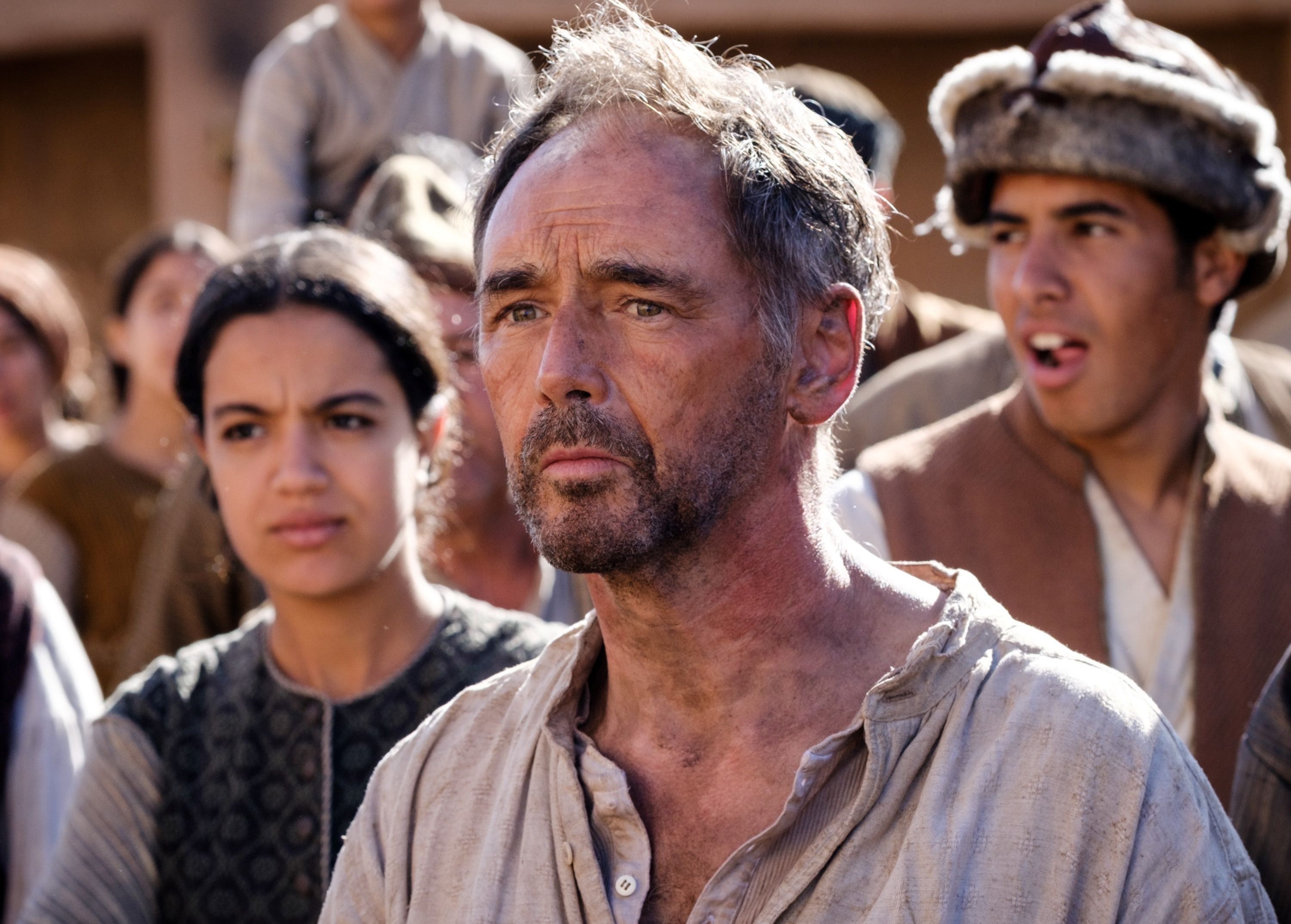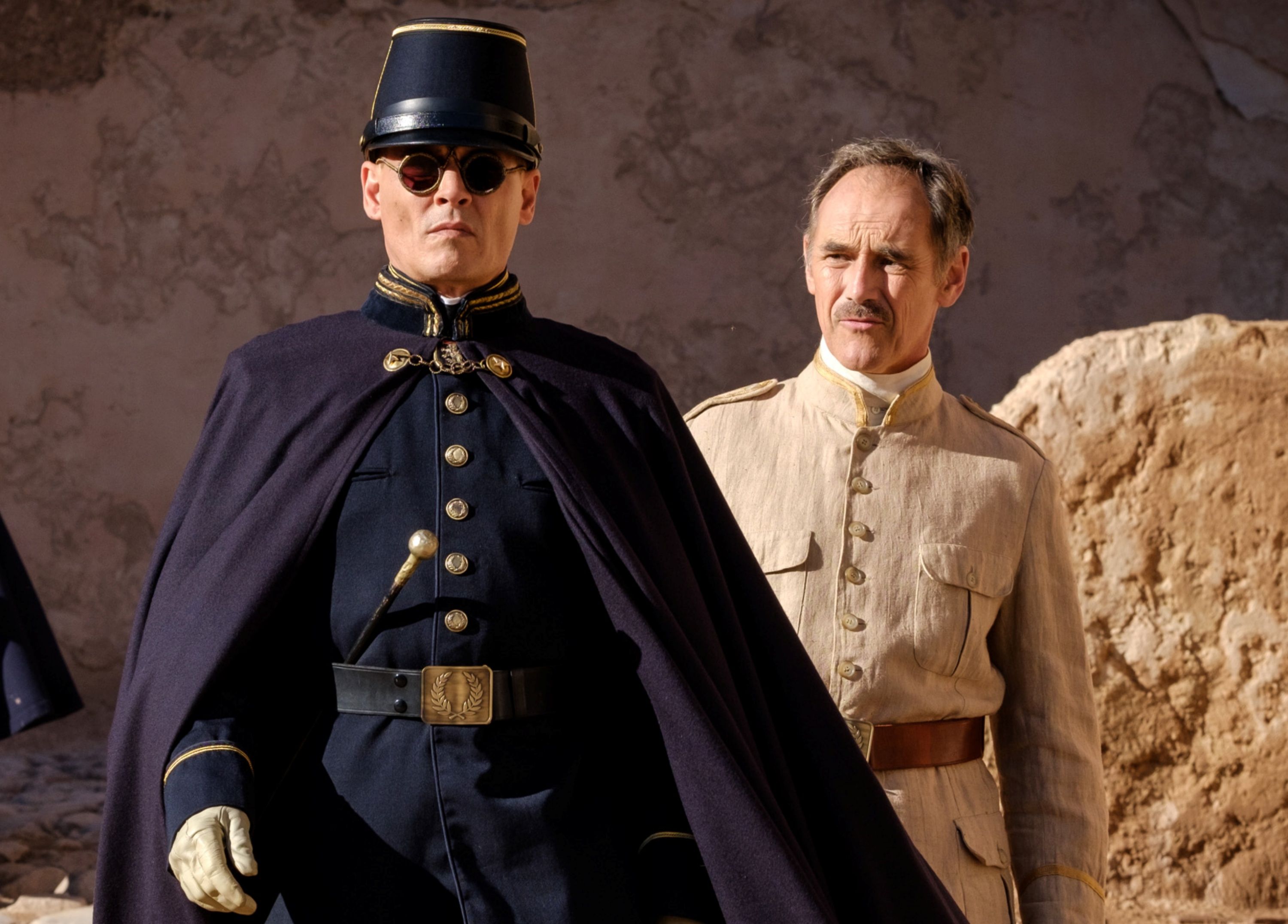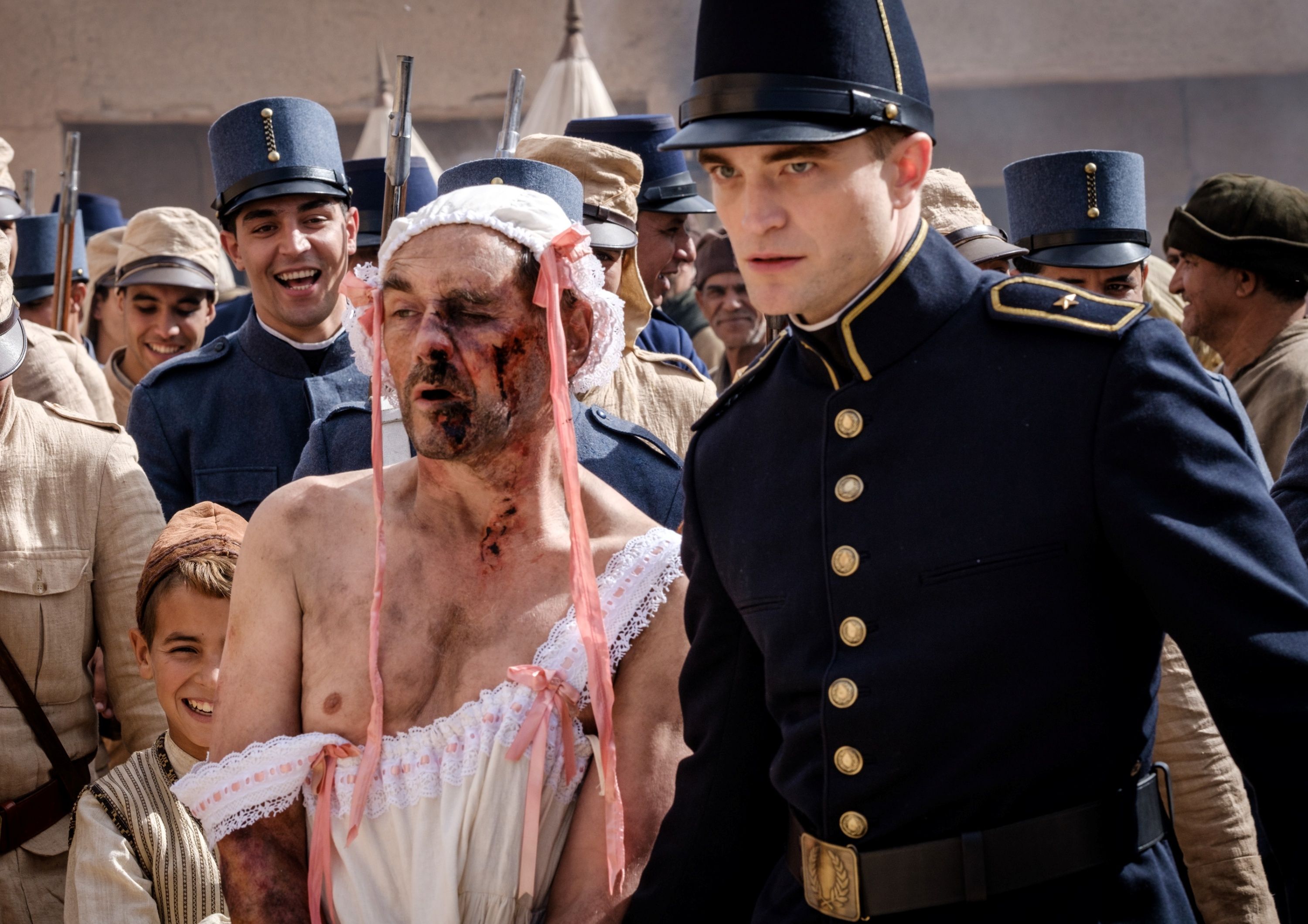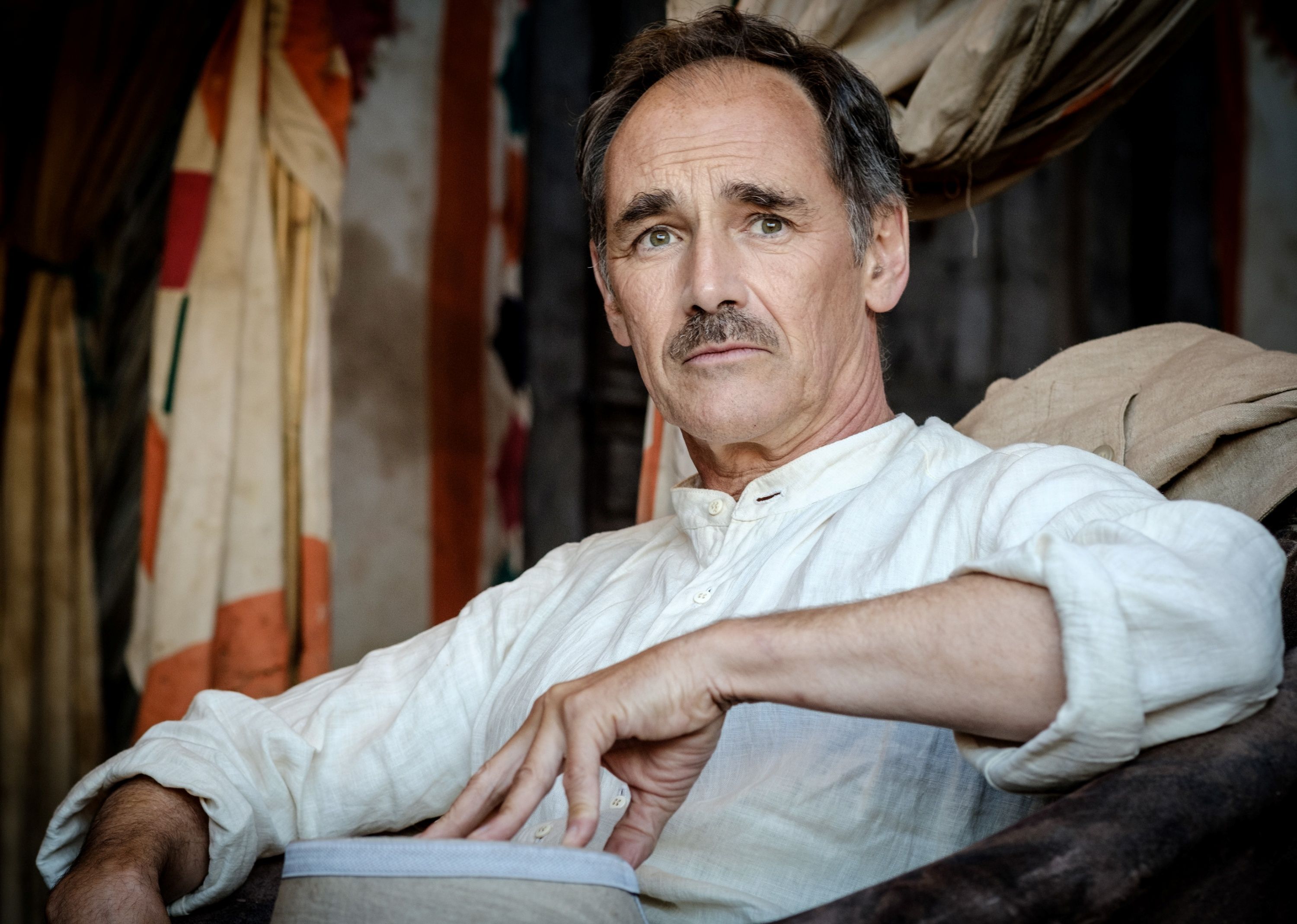From director Ciro Guerra and based on the novel by J.M. Coetzee, the drama Waiting for the Barbarians follows the Magistrate (Mark Rylance) of an isolated frontier settlement on the border of an unnamed empire. When Colonel Joll (Johnny Depp) arrives with the purpose of interrogating the locals about an impending uprising, his tactics are so cruel and horrific that it forces the Magistrate to question his loyalty, even if that act could have dire consequences.
During this 1-on-1 phone interview with Collider, actor Mark Rylance talked about why he was interested in this story, how he viewed his character, his experience with co-stars Johnny Depp and Robert Pattinson, and how he was involved with choosing the film’s director. He also talked about what it was like to make a film with director Terrence Malick, and his collaborative relationship with Steven Spielberg.
Collider: When this came your way, what was it that attracted you to it? Does it always start with the script and the story for you, or was it something specific about this story or this character that caught your attention?
MARK RYLANCE: It’s always the script and story, with any play or film, for me. I grew up in Wisconsin and was fascinated by all of the Indian names around, and eventually came to read about it and get involved in indigenous tribal people’s situation and rights. This story, he thinks he’s a friend of the tribal people and he tries to be a benevolent governor, but he’s really unable to live with them. His rescuing of them is still from a position of privilege and power. The realization that the enemies of the indigenous people who are personified in Joll (Johnny Depp) are actually just the flip side of the coin of his benevolent imperialism. He’s a foreigner in their land. He brings this girl in, which is very kind of him, I suppose, compared to Joll, but he’s not able to live with her, love her, give her an apartment, or treat her as an equal. He’s always in a powerful position, I felt, and eventually realizes that part of what he’s fighting against with Joll is actually in himself, as well. When I read the book and the script, that was a big revelation to me. If I come upon a story that moves me at a deep level, like that, and moves my perception of who I am, then of course, I’m interested in telling that story.
When it comes to playing a character like this, who’s only known as Magistrate, does that affect how you approach or play him? Do you do anything different when you’re playing someone who doesn’t really have a name?
RYLANCE: No, I don’t think so. It suggests that there’s an allegorical aspect to the story, when characters are named archetypes like that. There’s a mythical level awakened in the audience’s mind. With the great myths and fairytales, the people speak naturally. If they maybe have a supernatural aspect, they’re always quite grounded. So, I don’t feel like you should play differently in a film like this. Even if it were one of Charlie Kaufman’s films, or the wonderful, surreal films that have been made, or the mythical films that have been made, as an actor, you should be as natural as possible. Always, you want to be as distilled and simple as possible. That makes sense to me.
As an actor, I would imagine that you’re always hoping that the actors you share scenes with will up your own game, in some way. What was it like to lead this film and be at the center of this story, and share scenes with someone like Johnny Depp? What do you think he brought to your performance?
RYLANCE: Well, I had a lovely time working with Johnny Depp. He has become a dear friend. The thing with Johnny is that many people have many views about him, at the moment. He’s a very complex character who’s had a very, very extraordinary life, so far, and he brings that life where he is. I learn from all actors. I’m a little sad when the actors I’m playing with have a prepared performance that doesn’t really connect. They’re just doing their performance in front of the camera and they’re giving you stuff back, but they’re not trusting it. If we just connect, it will be fine. We don’t have to worry about ourselves. We should be worrying about the connection between ourselves and making that work Because Johnny is primarily a musician primarily at heart – he’s a wonderful actor, but he started as a musician – as soon as I started to play, he absolutely joined me. Every time we had scenes, we played them together. That’s a thrill and a delight, and you really learn, like playing against a tennis master like John McEnroe. What Johnny also brought was an enormous stillness and inner quality. He has a rich inner life, when you playing with him, and that’s very free. When you’re a very, very vulnerable person, it makes it okay to be vulnerable when you’re acting in scenes. I learned a lot from him.
How did an actor like Robert Pattinson compare?
RYLANCE: Robert is a phenomenal actor, who’s doing terrific things. He has a lot of incredible, pent-up, explosive energy that he can share, as an actor, which was very imprisoning, at times, and impressive. He’s very strong.
When you do a project like this, what’s the atmosphere like on set? Do you get time to find a sense of play?
RYLANCE: That’s why I’m an actor. I don’t see my films. I just love playing, and the theater gives me longer time to play, so it wins my heart a little bit more. Increasingly now, I’m feeling very lucky that I’m making films where you are encouraged to play and to have some have fun. [Producer] Michael Fitzgerald had been trying to make this film for about 20 years and, at one time, Werner Herzog was attached. He had enormous difficulty getting it made and had great difficulty during the film, raising the money.
When he came to me, he said that he saw Bridge of Spies and then thought, “Now, I have my Magistrate.” When he came to me, he didn’t have a director, so I was involved in the choice of director, which was fantastic for me. That was very exciting. I love Ciro Guerra’s films, and we just got on so well. A number of the crew were Colombian and they’d come to Morocco to film. At the end of the week, they’d dance, have cigars and drink tequila. They were wonderful people to spend time with.
You also did a movie with Terrence Malick. How did you find the experience of working with him?
RYLANCE: Oh, I loved it. I absolutely loved it. I know some people would find it challenging and I would understand why, but I just adored it. It was the closest to theater that any film set has been for me because he makes films without being concerned about continuity. He makes films with long takes. I remember doing a take and hearing the cameraman say, “Someone take the camera,” because he couldn’t hold it any longer. We’d been looping around the scene for 45 minutes. You move into areas of unconscious, when you’re allowed to go there for that long, and that’s primarily what Terrence is interested in. He’s interested in the accidental. That’s where he feels his particular muse comes to him. He’s always changing plans and lovingly things go different than any plan that might there might be.
When you do something like that, did that film even have a script, or is it something that forms more on set?
RYLANCE: You’re right on. I had 26 pages, for one scene, and it was mostly me because I was Satan talking to Jesus in the cave. We would just say what we’d feel, on the day. But I would say the lines because they were wonderful lines. That’s a film he’s worked to make for many decades, so the script was dense with different influences. The thing about him is that, for all the vulnerability and talent, the freedom that he’s asking you to give him, he is so encouraging and such a kind man that it’s a joy to him, to play for him.
At the same time, because he does film tons of stuff that never makes it into the movie, do you wonder whether or not you’ll even make it to the final cut, or do you feel pretty secure that you’ll be in the movie?
RYLANCE: Oh, I don’t care. I don’t care about that, really. It’s his baby and his soul moves him to do what he wants to do. I love his films, but if he felt that the film would be better without me in it, then great. I have no problem with that. I had a wonderful time. I’m not there when the film is shown, so that doesn’t really affect me. The thing that affects me is the way the film is made. When I’m on set, working with the other creative people, I’m so lucky to be involved in it, so that’s enough for me. I’ve heard the story about that being very upsetting to some people.
If you’re going to work and collaborate with a director multiple times, Steven Spielberg is a pretty good choice to do that with. What has that partnership and relationship been like? What do you enjoy about working with him as a director and doing so many various projects with him?
RYLANCE: Steven and I is a different level. I would be delighted to be friends with Terrence and Ciro, and I am friends with them, but Steven and I, he’s just a great friend. We just struck it off. It’s an odd thing because though he’s older than me, I sometimes feel like he’s a younger brother. His love and his joy for what he does is stronger and younger than mine. I have more of a melancholy note to my life and my soul, and he has such a positive way about himself. If he loves the story, he wants everyone to love it. He’s just an extraordinary friend. Whether we never made another film together again or not, wouldn’t matter. What matters more if I don’t see him for a long time, which I haven’t been able to do this year. I just miss him.
Maybe I’m part clown and part human being, but I really flourish with an enthusiastic director, and Steven is just the best at that. He can be quite demanding with his crew because he knows how to do everything they’re doing, but I’ve only ever seen him be incredibly encouraging and attentive and really thrilled by what the actors are doing. The thing about Steven that’s very interesting is that he’s always thinking of the audience. He’s editing at the same time and he’ll come the day after and say, “I think that we need to do one more thing here.” Anyway, he’s a genius at his craft.
Have you spoken to him about reuniting again? Do you know what the next thing is that you would do together?
RYLANCE: No, we haven’t. He’s got a lot of projects, all around him, that come to birth at different times. I think The Kidnapping of Edgardo Mortara is still in the background for him, but there hasn’t been any movement on it. There are other things that we’ve talked about, but I think it’d be premature for me to say anything about them.
Is he someone that you would say yes to, whenever he has a project that comes up?
RYLANCE: With Steven, yeah, and it wouldn’t matter what size part. In Ready Player One, I think I did five days. I would do the job, just to have the time being with him on set. I’m lucky to even be able to say that. Really lucky, me. I don’t know what he’s doing right now, but I’m sure when he needs me or wants me, he’ll come to me. And I send him ideas, too.
Waiting for the Barbarians is available on VOD.




